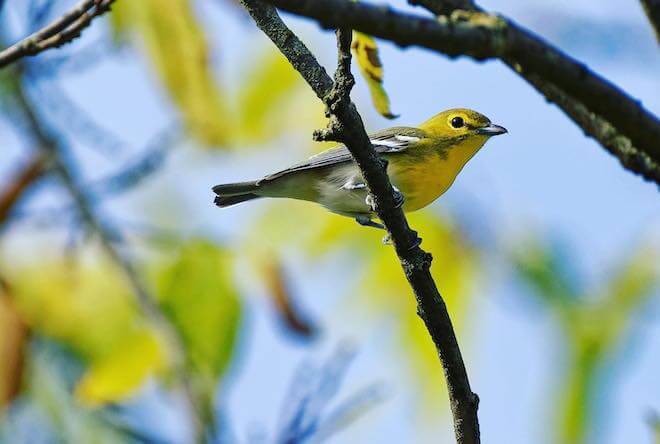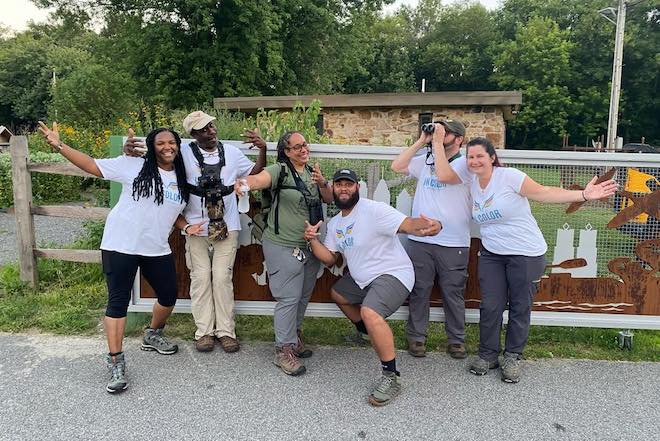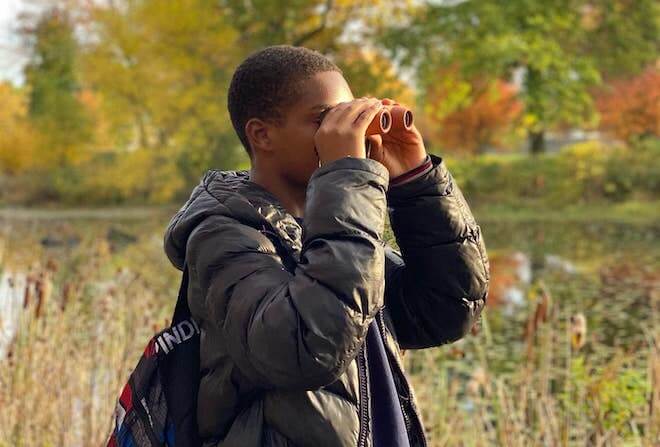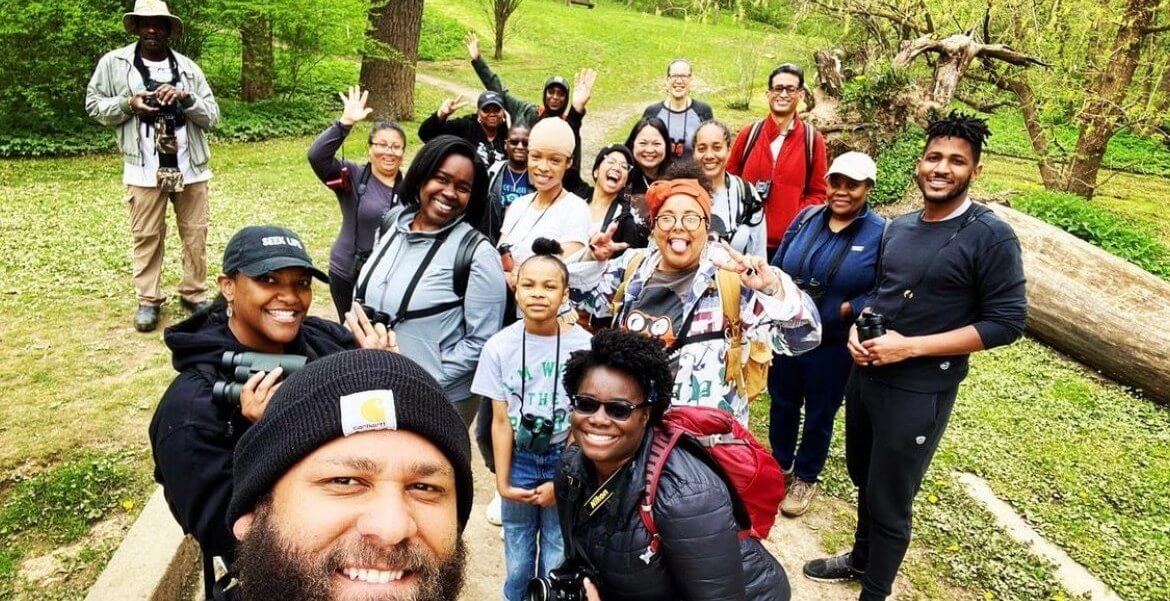Bernie Wilson is a 70-year-old retired English professor and a longtime “birder.” More specifically, he’s an avid bird photographer and lifelong outdoorsman. But it wasn’t until a few years ago, when the Germantown resident (his wife, really) happened upon Philly’s In Color Birding Club (ICBC) on Instagram that he saw himself as a member of a birding community. ICBC brings together birders from different walks — especially BIPOC like Wilson — for a single purpose: Enjoying some birds.
Wilson recalls his wife saying, “‘Oh look! Look at this group!’” He looked, and saw, “people like us. They were interracial. There were various sexual identities.; there were young people; there were old people.” He describes the couple’s first time joining In Color as “so different from any other bird walk that we had been on.”
Today, In Color Birding has become a second family for Wilson and dozens more BIPOC and “other” identifying birders, naturalists and interested parties who want to enjoy the outdoors — and birds — together, safely and joyfully.
Jeff Kenney describes ICBC’s walks as, “good times and good vibes guaranteed — good birds subject to availability.”
Who is birding for?

According to the U.S. Fish and Wildlife Service, 45 million Americans watch birds for fun. A leisure activity that requires little to no equipment or travel, birding has become a massive pastime for outdoor enthusiasts. Birds exist everywhere, from rural meadows and high mountains to the trees sitting in our backyards. Birding is also incredibly healthy — not just because it gets you outside and moving, but also because just looking and listening for birds outdoors promotes mental health. Hearing birdsong on its own is good for you.
This makes birding a wonderful pastime for people who’ve experienced stress and trauma. Through clubs like ICBC, residents are invited to physically and mentally unwind and destress with only one of the few free prescribed medicines, the great outdoors.
Natural spaces have not been safe spaces for Black people, because non-Black people assume Black people don’t belong there.
Of those 45 million American birders, only 4 percent are Black. This should not be surprising. We live in a culture where redlining is not confined to residential real estate practices, and social segregation continues in all manner of private and public spaces. Black people have been virtually redlined from parks and outdoor spaces for decades.
It’s also not surprising, then, that outdoors is where Karen was born — in particular, the Central Park Karen who told a 911 operator that Black birder Chris Cooper had assaulted her, when he really just asked her to follow park rules and leash her dog.
Natural spaces have not been safe spaces for Black people, because non-Black people assume Black people don’t belong there. Here in the United States, BIPOC are welcome on sporting fields, but not field fields.
Black birders unite
But Jason Hall, a Black birder with the IG handle @thebirdingbeardsman who’s been turning his camera on the Ngorongoro Crater in Tanzania recently, strongly disagrees. In 2021, in the wake of both the Central Park Karen fiasco and the creation of a national Black Birders Week, Hall came up with the idea for the In Color Birding Club.

“My goal is to create an intentional, safe, and joyful space for birders of color — to introduce people to the wonder of birding and the outside world,” Hall wrote in the Inquirer. Birding while Black should not only not be dangerous. It should be amazing.
Some of Hall’s favorite birds to watch and photograph in Philly: American goldfinches and downy woodpeckers. But he and his fellow birders have options: 300 species of birds reside or pass through our city every year. The best times to see them are fall and spring — right now — when they’re migrating.
Conversation scientist Corina Newsome regards organizations like ICBC as crucial to creating space for Black people to explore interests without feeling “othered.”
Hall started the club with a few fellow birding enthusiasts Jeff Kenney, Nicole Seahorn, Angela Romanczuk and Victoria Nicole. The group went out on their own to the old Meadows at FDR Park and took Philadelphia public school students on free field trips to John Heinz National Wildlife Refuge.
It wasn’t long before their numbers grew to include both beginners and bona fide pros like Corina Newsome, an associate conservation scientist at the National Wildlife Federation. Newsome is one of few BIPOC women biologists in her field — and has the distinct experience of being one of very few non-White attendees at 2,000-person wildlife conferences. She regards organizations like ICBC as crucial to creating space for Black people to explore interests without feeling “othered,” she says.
Being a birder “felt almost external to my identity as a Black person,” says Newsome. The pastime and passion was, she says, “this thing that I was almost ashamed of in some ways. I felt like people looked at me like I was a weirdo. When I would talk about birds, or be super interested, I expected to be outsidering myself, essentially. But becoming part of a community of Black birders, it’s like, Oh, no. This is part of my … my Blackness.”
Beyond birding
Now in its third year, ICBC leads open-to-everyone bird walks 25 to 30 times a year. Most meetups attract 10 to 20 birders, both individuals and families — folks of all ages and backgrounds.
Jeff Kenney describes the walks as, “good times and good vibes guaranteed — good birds subject to availability.”
More recently, ICBC launched efforts to promote birding and environmental causes beyond their walks. Conservation in the Community is a new initiative into partner with community leaders and grassroots environmentalists. The goal: Improve wildlife conditions for birds, and subsequently, communities. The program will include park and neighborhood cleanups, nature programs for schools — and political advocacy and organization for environmental justice.
Wilson believes the key to changing BIPOC’s sense of belonging outdoors begins with getting more people outdoors for educational activities, particularly young people. To this end, ICBC has come up with Bird Walks for The Youth to provide age-appropriate neighborhood bird walks for school-age children and teens. They’re also working on a bus sponsorship program to mitigate transportation costs for school trips to green spaces.

Bird joy
Wilson views birding as just one of many possible starting points to accessing, understanding and appreciating the environment. “If you get the young people to become more comfortable in this space that traditionally did not welcome us, they then own that space,” says Wilson. “And they will pass that same sense of security and comfort to their family to their children.” But it’s more than belonging. It’s having a great time.
Take a walk through Awbury Arboretum on an early Saturday morning, and odds are, you’ll find a binoculars-carrying birder or two trying to catch a glimpse of a green heron or Carolina wren. But join up with ICBC, and your quiet outing will feel more like … a party.
Wilson’s favorite part of birding with ICBC isn’t the photos he gets of warblers or robins. It’s the moments he shares while trekking through woodlands with his crew.
“When we’re out in the woods, we’re laughing; people are high fiving each other; people squealing with emotion. It’s a joy that Jason calls ‘bird joy.’ It’s not about that traditional, stodgy, ornithological approach to birding. We’re together — for many people — for the first time. Predominantly people of color come and we’re in nature together, and we just have a good time.” Wilson says.
![]()
MORE ON THE OUTDOORS AND ADVOCACY FROM THE CITIZEN



